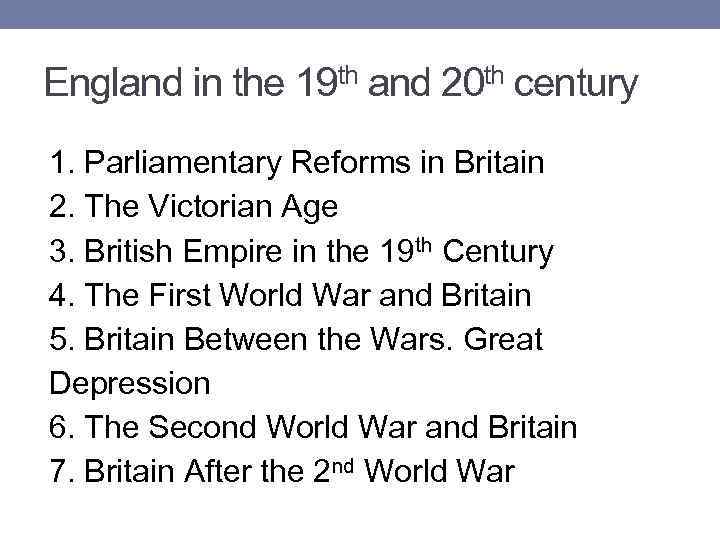 England in the 19 th and 20 th century 1. Parliamentary Reforms in Britain 2. The Victorian Age 3. British Empire in the 19 th Century 4. The First World War and Britain 5. Britain Between the Wars. Great Depression 6. The Second World War and Britain 7. Britain After the 2 nd World War
England in the 19 th and 20 th century 1. Parliamentary Reforms in Britain 2. The Victorian Age 3. British Empire in the 19 th Century 4. The First World War and Britain 5. Britain Between the Wars. Great Depression 6. The Second World War and Britain 7. Britain After the 2 nd World War
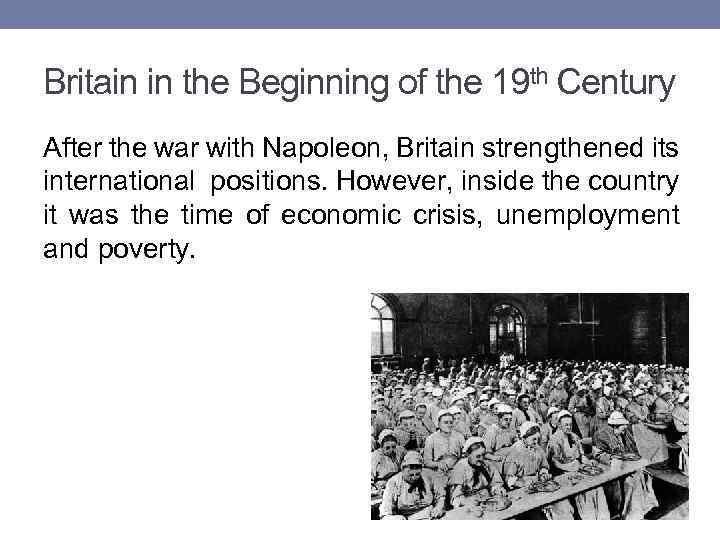 Britain in the Beginning of the 19 th Century After the war with Napoleon, Britain strengthened its international positions. However, inside the country it was the time of economic crisis, unemployment and poverty.
Britain in the Beginning of the 19 th Century After the war with Napoleon, Britain strengthened its international positions. However, inside the country it was the time of economic crisis, unemployment and poverty.
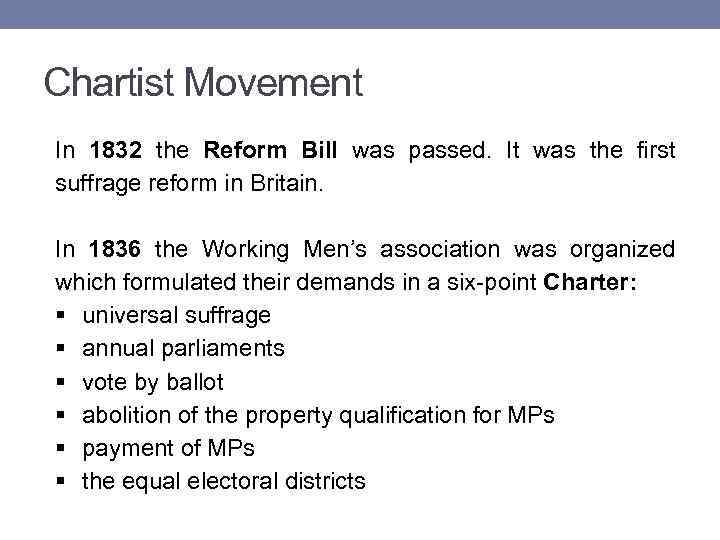 Chartist Movement In 1832 the Reform Bill was passed. It was the first suffrage reform in Britain. In 1836 the Working Men’s association was organized which formulated their demands in a six-point Charter: § universal suffrage § annual parliaments § vote by ballot § abolition of the property qualification for MPs § payment of MPs § the equal electoral districts
Chartist Movement In 1832 the Reform Bill was passed. It was the first suffrage reform in Britain. In 1836 the Working Men’s association was organized which formulated their demands in a six-point Charter: § universal suffrage § annual parliaments § vote by ballot § abolition of the property qualification for MPs § payment of MPs § the equal electoral districts
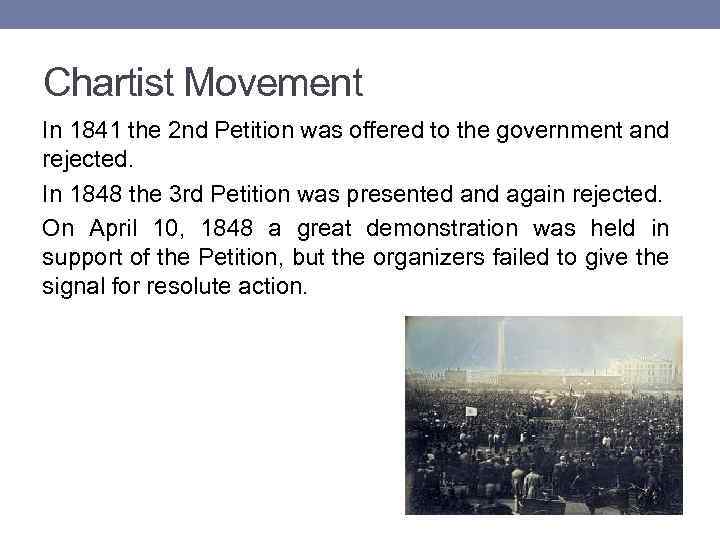 Chartist Movement In 1841 the 2 nd Petition was offered to the government and rejected. In 1848 the 3 rd Petition was presented and again rejected. On April 10, 1848 a great demonstration was held in support of the Petition, but the organizers failed to give the signal for resolute action.
Chartist Movement In 1841 the 2 nd Petition was offered to the government and rejected. In 1848 the 3 rd Petition was presented and again rejected. On April 10, 1848 a great demonstration was held in support of the Petition, but the organizers failed to give the signal for resolute action.
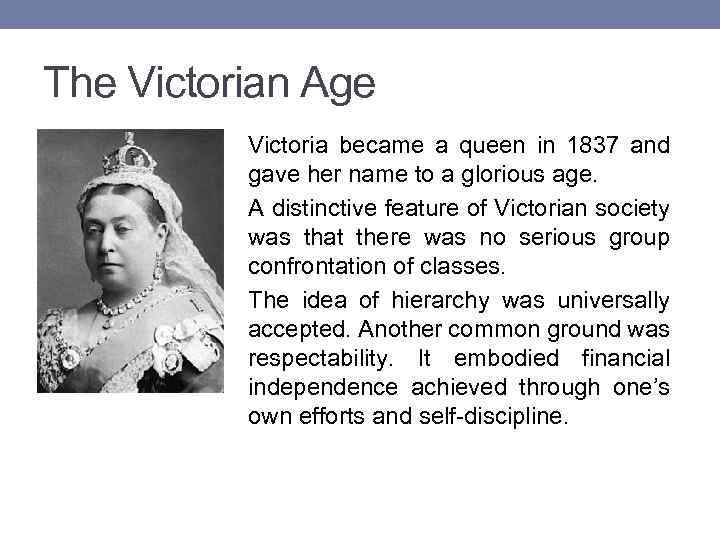 The Victorian Age Victoria became a queen in 1837 and gave her name to a glorious age. A distinctive feature of Victorian society was that there was no serious group confrontation of classes. The idea of hierarchy was universally accepted. Another common ground was respectability. It embodied financial independence achieved through one’s own efforts and self-discipline.
The Victorian Age Victoria became a queen in 1837 and gave her name to a glorious age. A distinctive feature of Victorian society was that there was no serious group confrontation of classes. The idea of hierarchy was universally accepted. Another common ground was respectability. It embodied financial independence achieved through one’s own efforts and self-discipline.
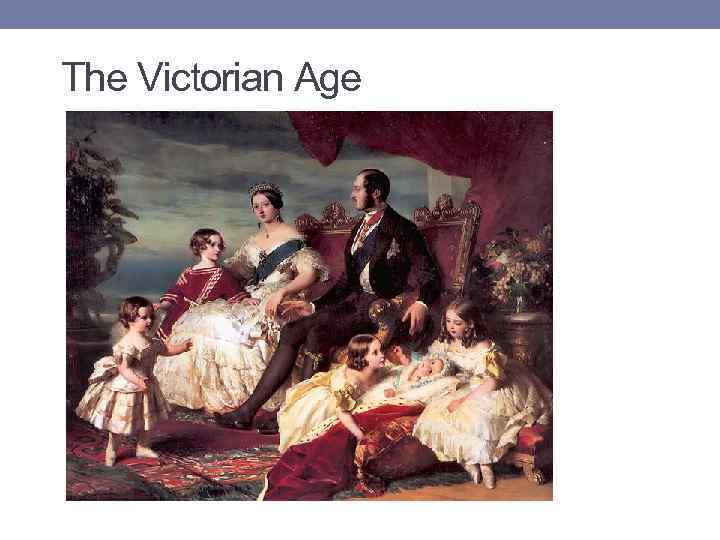 The Victorian Age
The Victorian Age
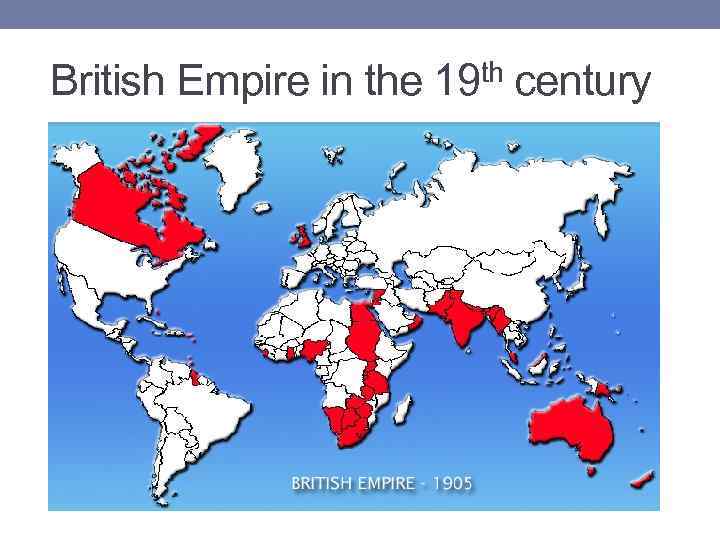 British Empire in the 19 th century
British Empire in the 19 th century
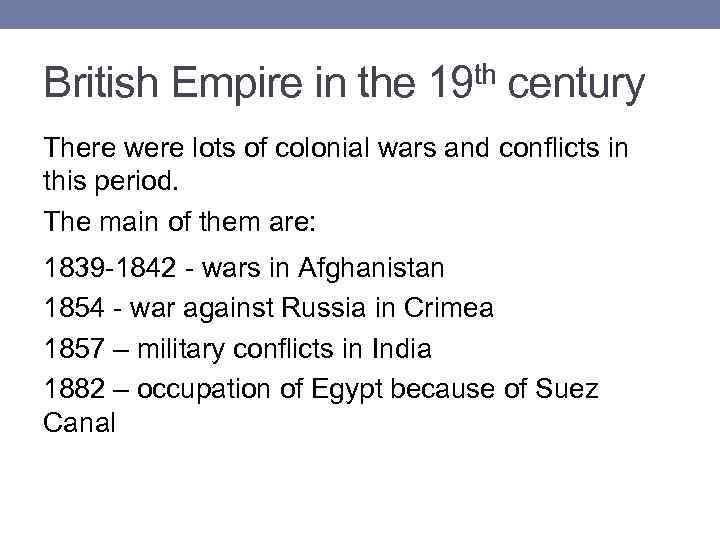 British Empire in the 19 th century There were lots of colonial wars and conflicts in this period. The main of them are: 1839 -1842 - wars in Afghanistan 1854 - war against Russia in Crimea 1857 – military conflicts in India 1882 – occupation of Egypt because of Suez Canal
British Empire in the 19 th century There were lots of colonial wars and conflicts in this period. The main of them are: 1839 -1842 - wars in Afghanistan 1854 - war against Russia in Crimea 1857 – military conflicts in India 1882 – occupation of Egypt because of Suez Canal
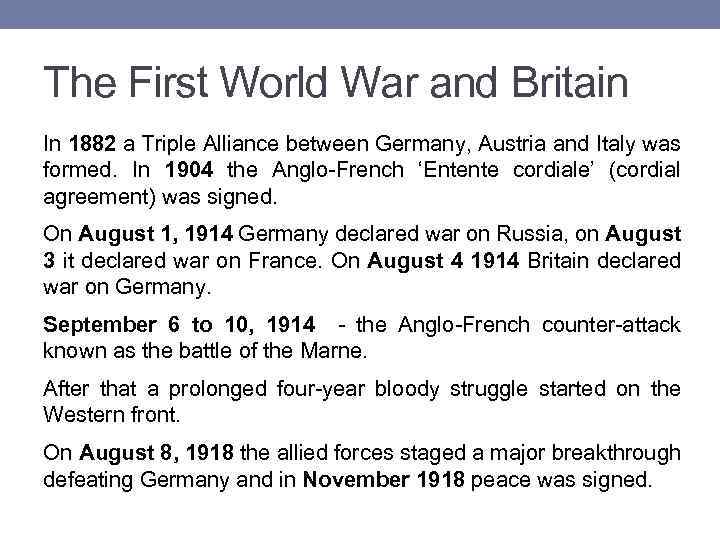 The First World War and Britain In 1882 a Triple Alliance between Germany, Austria and Italy was formed. In 1904 the Anglo-French ‘Entente cordiale’ (cordial agreement) was signed. On August 1, 1914 Germany declared war on Russia, on August 3 it declared war on France. On August 4 1914 Britain declared war on Germany. September 6 to 10, 1914 - the Anglo-French counter-attack known as the battle of the Marne. After that a prolonged four-year bloody struggle started on the Western front. On August 8, 1918 the allied forces staged a major breakthrough defeating Germany and in November 1918 peace was signed.
The First World War and Britain In 1882 a Triple Alliance between Germany, Austria and Italy was formed. In 1904 the Anglo-French ‘Entente cordiale’ (cordial agreement) was signed. On August 1, 1914 Germany declared war on Russia, on August 3 it declared war on France. On August 4 1914 Britain declared war on Germany. September 6 to 10, 1914 - the Anglo-French counter-attack known as the battle of the Marne. After that a prolonged four-year bloody struggle started on the Western front. On August 8, 1918 the allied forces staged a major breakthrough defeating Germany and in November 1918 peace was signed.
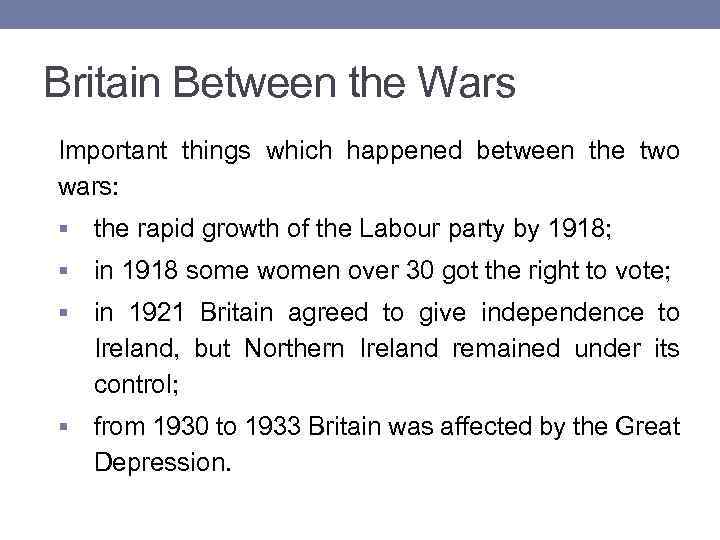 Britain Between the Wars Important things which happened between the two wars: § the rapid growth of the Labour party by 1918; § in 1918 some women over 30 got the right to vote; § in 1921 Britain agreed to give independence to Ireland, but Northern Ireland remained under its control; § from 1930 to 1933 Britain was affected by the Great Depression.
Britain Between the Wars Important things which happened between the two wars: § the rapid growth of the Labour party by 1918; § in 1918 some women over 30 got the right to vote; § in 1921 Britain agreed to give independence to Ireland, but Northern Ireland remained under its control; § from 1930 to 1933 Britain was affected by the Great Depression.
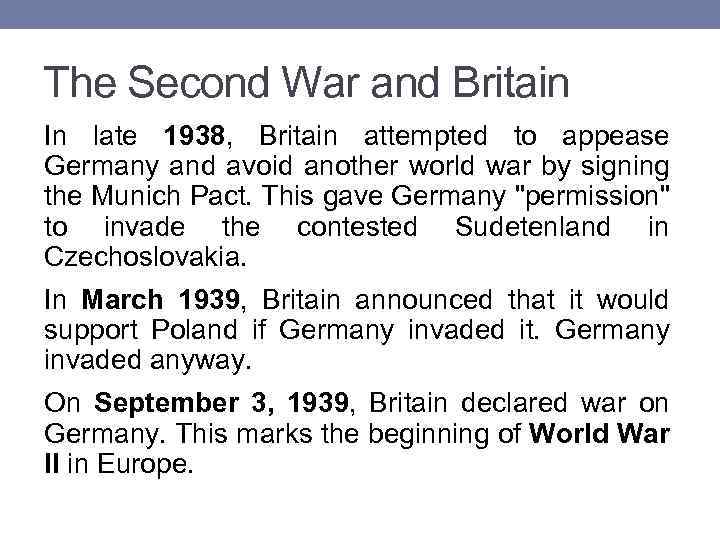 The Second War and Britain In late 1938, Britain attempted to appease Germany and avoid another world war by signing the Munich Pact. This gave Germany "permission" to invade the contested Sudetenland in Czechoslovakia. In March 1939, Britain announced that it would support Poland if Germany invaded it. Germany invaded anyway. On September 3, 1939, Britain declared war on Germany. This marks the beginning of World War II in Europe.
The Second War and Britain In late 1938, Britain attempted to appease Germany and avoid another world war by signing the Munich Pact. This gave Germany "permission" to invade the contested Sudetenland in Czechoslovakia. In March 1939, Britain announced that it would support Poland if Germany invaded it. Germany invaded anyway. On September 3, 1939, Britain declared war on Germany. This marks the beginning of World War II in Europe.
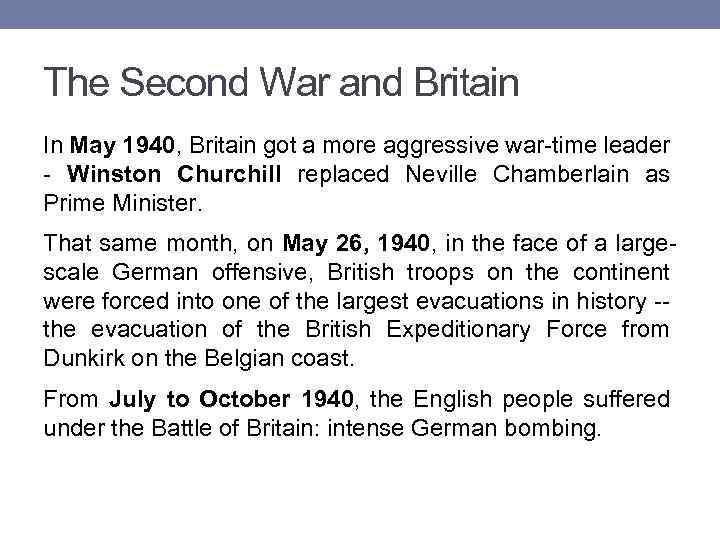 The Second War and Britain In May 1940, Britain got a more aggressive war-time leader - Winston Churchill replaced Neville Chamberlain as Prime Minister. That same month, on May 26, 1940, in the face of a largescale German offensive, British troops on the continent were forced into one of the largest evacuations in history -the evacuation of the British Expeditionary Force from Dunkirk on the Belgian coast. From July to October 1940, the English people suffered under the Battle of Britain: intense German bombing.
The Second War and Britain In May 1940, Britain got a more aggressive war-time leader - Winston Churchill replaced Neville Chamberlain as Prime Minister. That same month, on May 26, 1940, in the face of a largescale German offensive, British troops on the continent were forced into one of the largest evacuations in history -the evacuation of the British Expeditionary Force from Dunkirk on the Belgian coast. From July to October 1940, the English people suffered under the Battle of Britain: intense German bombing.
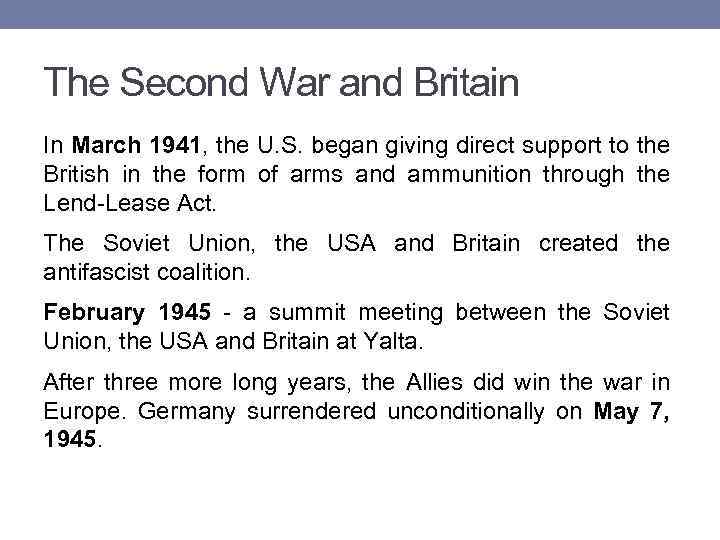 The Second War and Britain In March 1941, the U. S. began giving direct support to the British in the form of arms and ammunition through the Lend-Lease Act. The Soviet Union, the USA and Britain created the antifascist coalition. February 1945 - a summit meeting between the Soviet Union, the USA and Britain at Yalta. After three more long years, the Allies did win the war in Europe. Germany surrendered unconditionally on May 7, 1945.
The Second War and Britain In March 1941, the U. S. began giving direct support to the British in the form of arms and ammunition through the Lend-Lease Act. The Soviet Union, the USA and Britain created the antifascist coalition. February 1945 - a summit meeting between the Soviet Union, the USA and Britain at Yalta. After three more long years, the Allies did win the war in Europe. Germany surrendered unconditionally on May 7, 1945.


